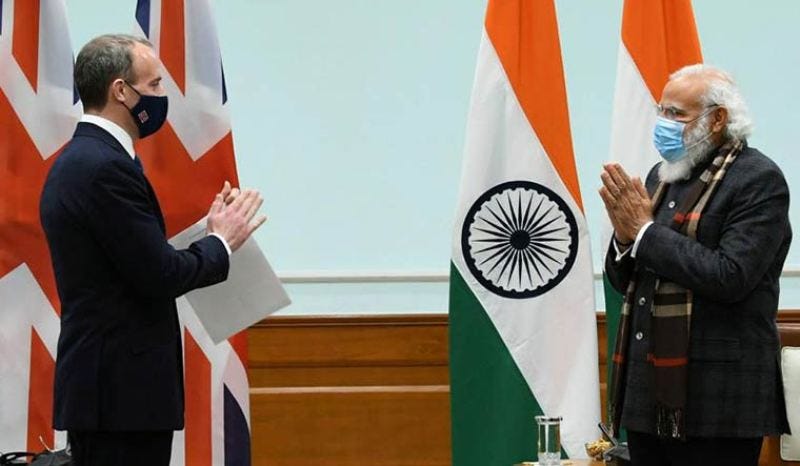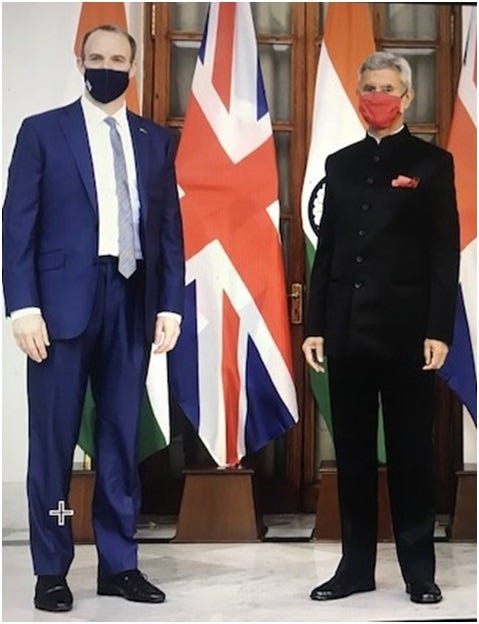[ad_1]

By: John Elliott
It’s hardly a career compliment for a foreign minister to be sent abroad during crisis talks on his country’s key international relationship, but that is what happened to Dominic Raab, Britain’s foreign secretary (minister), this week when Boris Johnson sent him to New Delhi for three days to prepare for a new relationship with India.
The positive spin is that Johnson is showing he has already moved ahead on the UK’s post-Brexit foreign relationships, without waiting for the current crisis negotiations to succeed or fail ahead of the December 31 deadline when Britain finally cuts loose from the European Union.
Raab met prime minister Narendra Modi on Dec. 16 (above) and talked about Covid-19 vaccinations, among other subjects – India’s Serum Institute is to produce over a billion doses of the vaccine that is being developed by Oxford University and AstraZeneca. Yesterday Raab met S. Jaishankar, the foreign minister.
The symbolism for a developed relationship is in place. Johnson has accepted Modi’s invitation to be the chief guest at Delhi’s annual Republic Day parade on January 26. Assuming it goes ahead on the ground, he will be able to revel in being on the top dais watching the parade of massed bands, guns, camels, dancers and jet fighters. And he has invited Modi to attend a G7 conference that the UK is hosting next year.
There is talk of an “enhanced trade partnership” being agreed next year ahead of a full free trade agreement that will be tougher to negotiate. Raab and Jaishankar, who was a top diplomat before becoming a minister, set a ”10-year UK-India roadmap” covering a predictable agenda of “people, trade and prosperity, defense and security, climate, and health”.
Britain’s relationships with Europe will clearly be difficult whether there is a trade deal or not this week, so Johnson has decided that Asia will be a primary focus, real or presentational. The UK’s established links stretch from Pakistan and India across South East Asia to Australia, and it has already signed a trade agreement with Japan. It has strategic and defense links with the region, which will grow next year when a naval Indo-Pacific deployment will include the new Queen Elizabeth aircraft carrier that is expected to sail into waters claimed by China.
It is also a member with India, Japan and the US of the Quadrilateral Security Dialogue, usually known as the Quad, that is developing into an alliance dedicated to resisting China’s territorial advances. Johnson would like the G7 to spawn a G10 of democracies and has invited Australia and South Korea to join next year’s G7 conference along with India.

Dominic Raab and S. Jaishankar
India, given the two countries’ history, is a big welcoming target despite growing criticism and resentment there about Britain’s old colonial excesses.
The question now is what it will all mean in practice apart from Britain replacing its old EU trading basis with bilateral India arrangements. There are already close links, and regular dialogues are taking place on all the subjects listed for the ten-year focus. Climate change will be a priority, maybe with green financing arrangements ahead of the COP26 climate change conference to be held in the Scottish city of Glasgow next November.
There will be considerable activity on the pandemic. India supplies more than 50 percent of the world’s vaccines and 25 percent of the NHS’s generic drugs. A new hub is being set up for sharing knowledge on clinical trials and regulatory approvals.
Such developments would however have taken place without Johnson’s search for new friends, and the UK has launched many such initiatives in recent years with far less success than had been hoped for. David Cameron, when he was prime minister, visited India three times, once with a plane load of senior ministers, officials, and businessmen but failed to make much impact. He also appeared with Modi at a mega overseas Indians rally in London’s Wembley stadium.
Then came the fallow years with Theresa May as prime minister. She made a disastrously stressful visit to India in November 2016, becoming caught up in differences over her rigid student visa regime and learning that she could not do that on visas and expect open doors for goods and services.
After the visit, it seemed that she tried to avoid dealing with India – even refusing, I was told, offers of foreign office briefings on the country.
Johnson is certainly interested and knows the country well – his former wife, Marina Wheeler (they divorced earlier this year), had an Indian mother. But he will face difficulties. A Sikh MP asked him in parliament last week whether he would support Indian farmers who are currently protesting Modi’s new agricultural laws. He ducked the question by, apparently mistakenly, giving a conventionally neutral answer on India-Pakistan relations.
He will brace up well with Modi and, if they have nothing else to chat about, they can mourn the defeat of their common presidential friend, Donald Trump. They both admired him, and the compliment seemed to be returned, so they can speculate about his plans for disruption away from the White House.
John Elliott is Asia Sentinel’s South Asia correspondent. He blogs at Riding the Elephant. He is the author of Implosion
This article is among the stories we choose to make widely available. If you wish to get the full Asia Sentinel experience and access more exclusive content, please do subscribe to us.
[ad_2]
Source link